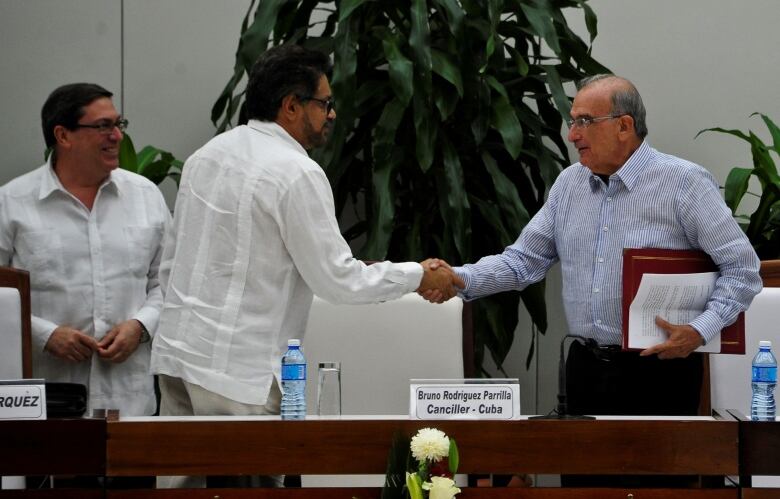'Peace cannot wait anymore': Colombia, FARC rebels reach new deal to end 52-year war
Accord comes weeks after original deal was rejected by Colombian voters in referendum

Colombia's government and Marxist guerillas said on Saturday they had agreed on a new peace deal to end their 52-year war, six weeks after the original one was narrowly rejected in a referendum for being too lenient on the rebels.
The government and Revolutionary Armed Forces of Colombia (FARC), who have been negotiating a deal in Havana for four years, said they had incorporated changes proposed by various sectors of society into the accord.
- ANALYSIS 'A leap into the unknown': Colombia's rejection of FARC treaty throws peace process into chaos
- Colombian President Juan Manuel Santos wins 2016 Nobel Peace Prize
- Colombians narrowly reject peace deal with FARC rebels
"We have reached a new final accord to end the armed conflict that integrates changes, precisions and proposals suggested by the most diverse sectors of society," both sides said in a statement.
"We call upon all Colombia and the international community....to back this new accord and its quick implementation so as to leave the tragedy of war in the past," the statement read. "Peace cannot wait anymore."

Chief government negotiator Humberto de la Calle says that he and rebel negotiator Luciano Marin, alias Ivan Marquez, signed the deal in Cuba, putting an end to a half-century-long conflict that has claimed more than 220,000 lives
On Saturday, De la Calle said the negotiations had been intense. "We worked 15 days and nights to reach this new agreement."
He said among the modifications made were related to punishments and justice for participants in the conflict accused of war crimes.

De la Calle said the accord also takes foreign magistrates off special peace tribunals, although there will be foreign observers, and stipulates the FARC must turn in "exhaustive and detailed" information about its involvement in the drugs trade.
He said the exact details would be released later.
"We are convinced that this accord offers roads to peace that are viable and possible," he said.
FARC negotiator Marquez said "the implementation of the accord is all that remains for the construction of the bases for peace in Colombia."

However, former president Alvaro Uribe, who led opposition to the original deal, said he asked for the opportunity for his camp and the victims of the conflict to briefly study the new accord before its implementation.
"I have asked the president that the texts they announce in Havana not be definitive," he said in a statement posted on his Twitter account, adding that his camp might want to make some further tweaks.
Uribe and his supporters had demanded stiffer penalties for rebels who committed war crimes and criticized the promise of a political role for the FARC.

In a televised address Saturday night, Colombian President Juan Manuel Santos said he had instructed De la Calle and the negotiating team to return to Bogota to explain the details of the new accord to the No campaign led by Uribe.
Santos said that an issue where negotiators did not achieve advances was on the insistence by opponents of the peace deal that guerrilla leaders not be allowed to run for elected office.
"We won't have assigned legislative seats. To the contrary, they will have to participate in elections. Nor will they have positions in government, as has occurred in other cases. But yes they can be elected," he said.

It is still unclear if Santos will put the new accord up for a popular vote.
The Colombian government and FARC inked an initial peace deal on Sept. 26 amid international fanfare after more than four years of negotiations, but voters rejected it on Oct. 2 by just 55,000 votes, dealing a stunning setback to Santos who was awarded the Nobel Peace Prize for his efforts to end Colombia's conflict.
Santos immediately began looking for ways to rescue the deal and the sides extended a cease-fire until Dec. 31 to get the modified deal done. The rebels insisted they wouldn't go back to the drawing board and throw out years of arduous negotiations with the government.
With files from CBC News and The Associated Press